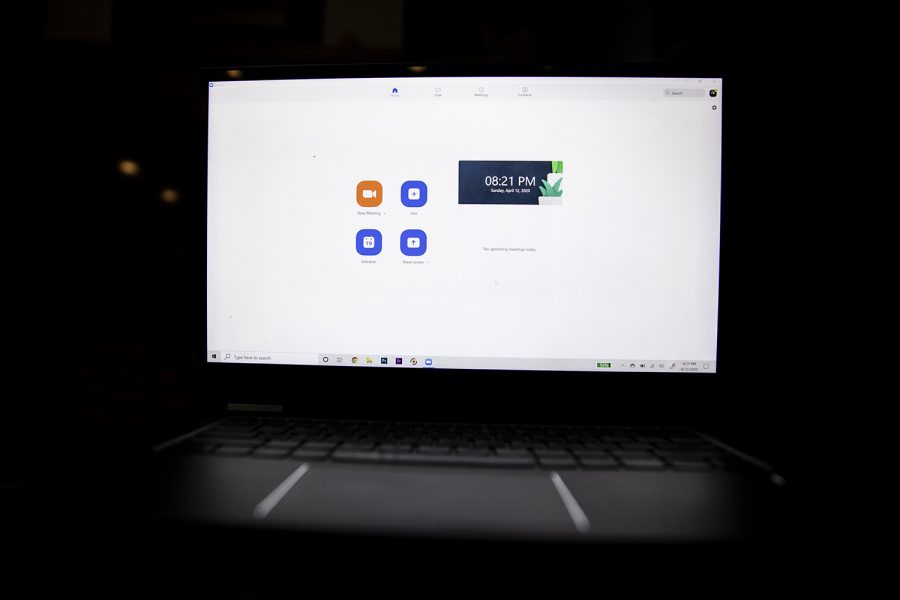‘Zoombombing’ disrupts online connections as UI classes, government meetings move online
Professors at the University of Iowa and the Iowa City City Council have experienced ‘Zoombombing’, a disruption to meetings conducted over the video platform Zoom. These disruptions have caused users to take tighter security measures for meetings.
Photo Illustration by Ryan Adams
April 12, 2020
When Professor Elke Heckner logged on to a scheduled Zoom class session 20 minutes early, she found three unexpected visitors.
None of the trio were students in the interim University of Iowa German Department departmental executive officer’s class. All of their screen names were displayed, and all displayed racist and antisemitic symbols in their backgrounds.
Heckner’s class, The Politics of Memory, discusses the Holocaust and genocide and is a diversity and equity course, so she was concerned the three Zoom users would use her class as a platform to spread racist and anti-Semitic messages. She asked the three to leave and threatened to call the police in an effort to make them log off.
The university-wide move to virtual classes and meetings has required students, faculty, and staff to learn new online platforms such as Zoom to communicate. Some users of the platform, such as Heckner, have experienced unwanted guests and content in their meetings.
Dubbed “Zoombombing,” uninvited participants log onto a meeting via Zoom and intrude with inappropriate or offensive pop-up content, creating disruptions across the country as classes and businesses move their work online to help mitigate the spread of the novel-coronavirus.
The three Zoom users left the meeting before Heckner’s class started, but she postponed the start of the class because she was still shaken from the event and wanted to ensure a secure link for the course.
Aiming to prevent another of her classes being Zoombombed, Heckner has started securing the class link through an authentication system that makes sure users have a HawkID.
“It’s actually really easy to set up a secure link for students so that only invited participants can join in,” Heckner said. “It is just a question of setting up Zoom with authentication methods and requiring an additional password which will exclude anybody who doesn’t have a HawkID.”
UI Information Technology Services changed default settings in Zoom to discourage Zoombombing from happening, said Nicole Riehl Dahya, communications manager in the UI Office of the CIO, in an email to The Daily Iowan. These changes include muting all meeting participants on entry and turning off any ability to join before the host, she added.
ITS discourages faculty, staff, and students from posting meeting information on social media, Riehl Dahya said, and instead suggests sending private invitations to participants. Zoom also has additional privacy options for users to keep their meetings secure, she said.
“We are aware of a handful of cases and are extremely disappointed that anyone would disrupt an online course with inappropriate material,” Riehl Dahya said. “It is completely counter to the university’s core values, which include diversity and respect.”
The best thing to do is prevent Zoombombing before it happens, she said, but meeting hosts should know how to remove people from a meeting, how to lock a meeting, and how to control who is sharing a screen in case it does occur.
The UI Information Security and Policy Office has not seen evidence at this point that Zoombombing creates other security issues, Riehl Dahya said. If faculty experiences Zoombombing, they should reach out to the ITS Help Desk to report it, she added.
UI President Bruce Harreld and Provost Monsterrat Fuentes contacted the participants in one webinar that was disrupted by sexually explicit or racist materials, stating in an email letter “hateful messages of any kind have no place on our campus.”
In an email to the DI, Assistant Vice President for External Relations Jeneane Beck said one of the participants of the webinar contacted the FBI, but that she didn’t know the name of the participant or whether the FBI is investigating the incident. Neither the president nor the provost has had any exchanges with the FBI, she said. She didn’t say which webinar it was.
In the email from Harreld and Fuentes, the two emphasized that while many disruptions are caused by those outside the UI community, any students found disrupting or obstructing teaching may face sanctions.
The UI community is not alone in its experiences with Zoombombing.
The Iowa City City Council experienced technical difficulties in its April 7 meeting via Zoom, with a Zoombombing occurrence during community comment.
As City Manager Geoff Fruin updated the city councilors on the MidAmerican solar-energy project, a video from Pornhub appeared on the Zoom feed. Immediate action was taken to shut down the existing video as city councilors left the meeting to create a more secure viewing environment with a password.
This was the second full meeting City Council has conducted over Zoom, City Councilor Janice Weiner told the DI.
RELATED: Iowa City City Council spikes solar energy project in Waterworks Prairie Park
“We had a lot of people on at that point, a lot of people who were planning to comment, as well as city council and city staff, but everybody just sort of stayed calm and stayed cool,” Weiner said. “They got it taken down, and then we proceeded with the rest of the day.”
The City Council did not have any issues with Zoom before the Zoombombing event, she said. Even after its move to virtual meetings, she said, the City Council has seen a lot of interest from the public in participating in community comment.
“We were doing Zoom while some other [city councils] around here were still doing in person meetings, it’s incredibly important for us to model the correct behavior,” Weiner said. “So, whether it’s comfortable or not, us stepping up and doing that early on, I think was a really important signal to the community.”



